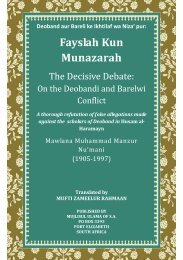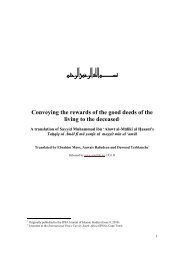al_etidaal_gn
al_etidaal_gn
al_etidaal_gn
Create successful ePaper yourself
Turn your PDF publications into a flip-book with our unique Google optimized e-Paper software.
According to another report Ibn Masood (Radi<strong>al</strong>lahu anhu) <strong>al</strong>so performed only two<br />
rakaahs with Sayyidina Uthman (Radi<strong>al</strong>lahu anhu) in the early stages of his<br />
C<strong>al</strong>iphate. (Bukhari).<br />
But in spite of <strong>al</strong>l this it is reported in Sahih of Abu Dawood that Abdullah bin<br />
Masood (Radi<strong>al</strong>lahu anhu) still performed four rakaahs with Sayyidina<br />
Uthman (Radi<strong>al</strong>lahu anhu). Someone told him: “But how is it that you once<br />
objected to Sayyidina Uthman (Radi<strong>al</strong>lahu anhu) performing four rakaahs (at Mina)<br />
and now you still go ahead and perform four (instead of two).” He replied “Opposing<br />
someone is a severe thing.”<br />
The reason for his giving this reply is clear: Abdullah bin Masood (Radhi<strong>al</strong>lahu anhu)<br />
considered Sayyidina Uthman (Radi<strong>al</strong>lahu anhu) a musafir i.e. traveller (who should<br />
re<strong>al</strong>ly only perform two rakaahs). However he had made the intention of becoming a<br />
resident (muqeem) and thus made four. Now this Abdullah bin Masood (Radi<strong>al</strong>lahu<br />
anhu) is a mujtahid and so is Sayyidina Uthman (Radi<strong>al</strong>lahu anhu). Abdullah<br />
(Radi<strong>al</strong>lahu anhu) did not consider that the verdict and findings of his research should<br />
be compulsory for another mujtahid to act upon.<br />
Someone asked Sayyidina Umar: “Will you appoint someone to be your successor as<br />
C<strong>al</strong>ipha?”<br />
He replied: “If I do not appoint my successor, I will have a leg<strong>al</strong> right not to do so<br />
because Rasulullah (S<strong>al</strong>l<strong>al</strong>lahu Alayhi Was<strong>al</strong>lam) did not (through command of<br />
reve<strong>al</strong>ed texts) do so. And if I do appoint my successor, I will <strong>al</strong>so have a leg<strong>al</strong> right<br />
to do so because Sayyidina Abu Bakr (Radi<strong>al</strong>lahu anhu) appointed me.”<br />
According to the view of Abu Bakr (Radi<strong>al</strong>lahu anhu), after the struggle against those<br />
who refused to give Zakaat, the we<strong>al</strong>th of those refusers of Zakaat was considered as<br />
booty and their wives and children in the order of slaves. Sayyidina Umar (Radi<strong>al</strong>lahu<br />
anhu) disagreed with this verdict.<br />
During the C<strong>al</strong>iphate of Abu Bakr (Radi<strong>al</strong>lahu anhu) this was the fatwa and it was<br />
accepted by Umar (Radi<strong>al</strong>lahu anhu) and the other Sahabah (Radi<strong>al</strong>iahu anhum).<br />
However, during the C<strong>al</strong>iphate of Umar (Radi<strong>al</strong>lahu anhu), Umar (Radi<strong>al</strong>lahu anhu’s)<br />
fatwa was accpeted and acted upon. (Fat-uI-bari).<br />
It is a fact that according to Iman Shafi (Rahmatullah Alayh), the recitation of the<br />
Dua-e-Qunoot in Fajr S<strong>al</strong>aah is Sunnat. Once he visited the grave of Imam Abu<br />
Haneefah and had to perform Fair S<strong>al</strong>aah there.<br />
In the S<strong>al</strong>aah he purposely did not recite the Qunoot (and according to other reports.<br />
did not recite BISMILLAH loudly, which is <strong>al</strong>so a Sunnat according to him). When<br />
asked about this, he replied: ‘‘The respect for the inmate of this grave prevented me.”<br />
Some people raise objections against this story saying: “How is it that acting<br />
according to the Sunnat can be discarded because of respect for any man?” The<br />
Al- Eti’da<strong>al</strong> Fi Maraatibur- Rija<strong>al</strong> 159




